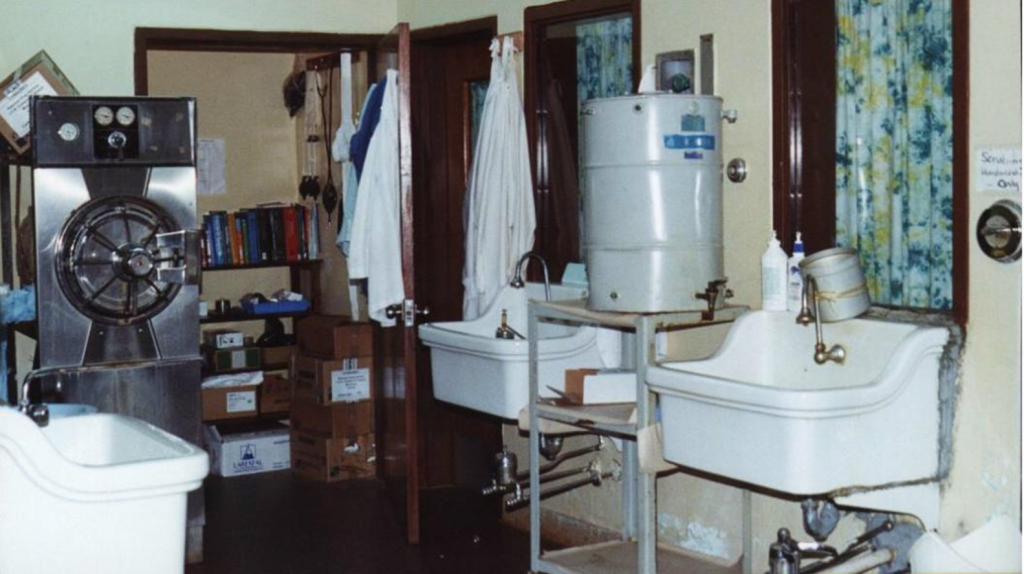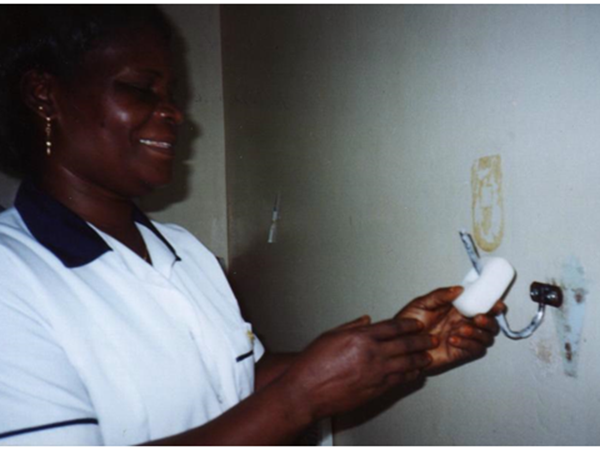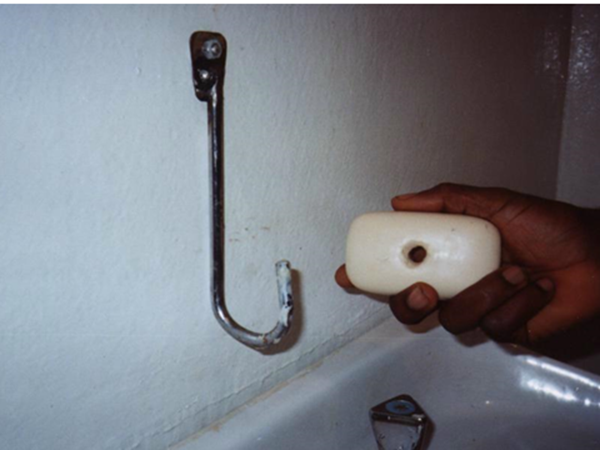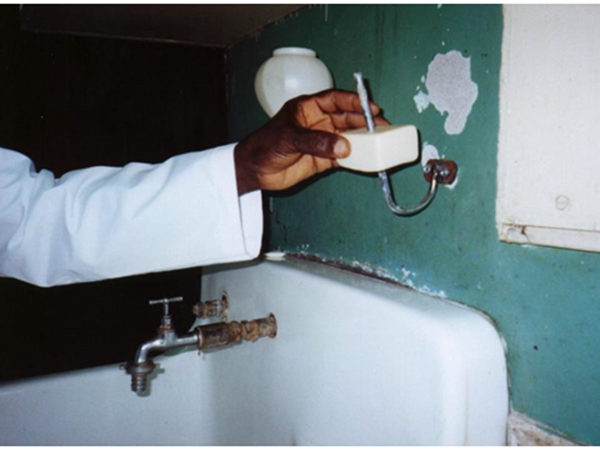Abstract:
According to the Centers for Disease Control, proper hand washing, with soap and clean running water, is the single most effective way to prevent the transmission of disease. However, in many countries, soap is in short supply and thus, the healthcare workers need to be innovative in the way they ration the soap they do have. Sometimes those efforts fall short and the soap itself can become the source of contamination.
Main Article:
In the year 2000, war-torn Liberia was struggling to rebuild its infrastructure. Many institutions, including hospitals, were forced to conduct daily business with less-than-ideal personnel, equipment and supplies. Adding to these challenges, the country was ravaged by a malaria outbreak. Humanitarian and medical teams were sent from all over the world to assist.
Nancy Haberstich, an American nurse and global infection control professional, was part of a team sent to Suakoko, Liberia. Nancy and other medical missionaries were to assist in the reopening of the Phebe School of Nursing and Paramedical Training Programs. While volunteering at the hospital adjacent to the school, Nancy noticed open soap slurries at the hand washing stations.
In Liberia, bar soap is a luxury
In Liberia, bar soap is a luxury and many aid efforts to the area included donations of soap. To extend the life of the hospital’s donated bars of soap, the nurses had been creating the soap slurries by shaving the remains of each bar into a bucket and mixing them with water. It was a creative way to use leftover soap, but they did not realize they were creating a perfect environment for the growth of bacteria, which thrive in warm, wet, dark environments, such as hospital restrooms in the hot African climate.
Studies on the use of bulk liquid hand soap in refillable dispensers have shown that washing with contaminated soap can increase the number of opportunistic pathogens on the hands, such as Klebsiella pneumoniae, Serratia marcescens, Enterobacter, and Pseudomonas species. The soap slurries in this Liberian hospital presented an even less sanitary situation than those in the studies and the problem was further exacerbated by the multitude of flies sitting on the surface of the mixture.
Nancy recognized that germs transferred to the slurry during washing, would find perfect conditions for growth, and then the contamination would spread to the next pair of hands. It was an invisible, but very serious, threat to both staff and patients.
The seed for a solution came from another American missionary who was serving as the hospital’s non-medical administrator. With this one idea, the entire team came together to tackle this issue.
A Team Solution to Discourage Germ Growth
Years earlier, on a small Scandinavian ship, the administrator had seen a “soap holder” consisting of a large wooden dowel mounted on the wall. A bar of soap with a hole drilled through it had been threaded onto the dowel to keep it in place as the ship rocked. To wash hands, passengers and crew would simply wet their hands and then rub them on the soap.
The challenge of creating a similar holder at the Suakoko hospital was finding existing materials to construct a viable prototype. A perfect solution came from a resourceful hospital maintenance engineer, Kollie Massaquoi. He removed the hooks from an IV pole and screwed the U-shaped bars to the wall above the hospital’s sinks.
“We didn’t need the IV poles at the time because we had no IV bags or bottles for infusions,” Nancy explained.
Mr. Massaquoi drilled holes in the hospital’s bars of soap and threaded them onto the wall-mounted IV hooks. The new “soap dispensers” could be used as they had been on the ship: simply by wetting the hands and rubbing them on the hanging soap.
“Even better, we explained to staff that the most effective way of using a bar of soap is to remove the bar, wash your hands, then wash the bar of soap itself under the water to remove any contamination,” Nancy said. Between uses, the soap dried on the hook, discouraging bacteria growth.
The hospital team was pleased with the creation of the new soap dispensers. Nancy said she could see that they needed and wanted to improve their processes, and the new soap dispensers were an inspirational victory for everyone.
the new soap dispensers were an inspirational victory for everyone
“Most of the staff really wanted to catch up with their profession, which had been interrupted by 10-plus years of civil war,” Nancy explained. “Quite honestly, I found they had a real interest in the quality of care delivered at this once-stellar hospital. It was satisfying to see the staff pull together to solve this challenge. It was doubly important, because the success of the nursing and paramedical training programs would be contingent upon good clinical experiences for the students.”
Making a Difference with Soap
Organizations like Global Soap, Clean the World and Soap Aid are making a difference in improving the health and well-being of families and communities. Clean the World collects and recycles soap from hotels in North America, Europe and parts of Asia, while Global Soap focuses on the distribution of the recycled soap and the delivery of hygiene education to those who need it most. Soap Aid provides similar services from its home base in Australia. As part of its mission, Global Soap also provides microloans to help with the development of local soap producers and distributors in developing countries.
Proper hand washing is one of the most basic, yet important methods of preventing the spread of disease. It is among the most effective ways to prevent diarrheal diseases and pneumonia, which together are responsible for over 1.7 million deaths in children under 5 each year. Providing soap and the education and resources to ensure its proper storage and use will make a remarkable difference in the health of vulnerable populations.
Proper hand washing is one of the most basic, yet important methods of preventing the spread of disease
Images:


Read More:
Patient Hand Hygiene: The missing link in preventing Hospital Acquired Infections?
https://infectioncontrol.tips/2015/12/09/patient-hand-hygiene-the-missing-link-in-preventing-hospital-acquired-infections/
Building a Career In Infection Prevention: Jomcy’s Story
https://infectioncontrol.tips/2015/11/13/building-a-career-in-infection-prevention-jomcys-story/
Hand Hygiene Nigeria: Implementation Lessons
https://infectioncontrol.tips/2015/11/13/hand-hygiene-nigeria-implementation-lessons/
References:
CDC Handwashing : Clean Hands Save Lives (2015, September 15). Retrieved from: http://www.cdc.gov/handwashing/
Heinze, John E. and Frank Yackovich (1988, February) “Washing with contaminated bar soap is unlikely to transfer bacteria”. Retrieved from: http://www.ncbi.nlm.nih.gov/pmc/articles/PMC2249330/pdf/epidinfect00010-0139.pdf
Zapka, Carrie et al (2011, May). “Bacterial Hand Contamination and Transfer after Use of Contaminated Bulk-Soap-Refillable Dispensers” Retrieved from: http://aem.asm.org/content/77/9/2898.full














